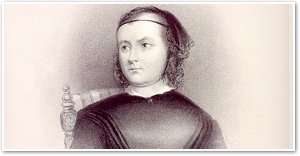Caroline Chisholm
- JOHN JANARO
Two hundred years ago, Australia was virtually unknown to most of the world.
 Caroline Chisholm
Caroline Chisholm1808-1877
The British had planted their flags and begun a penal colony there, in a land ten thousand miles away from England with a seemingly harsh environment. There were also free immigrants, mostly poor people in search of new opportunities. In most cases, families were separated, husbands from wives, parents from children half a world away. The new Australians faced desperate circumstances in a distant land, and didn't know where to turn for help.
In 1838, however, Australian immigrants and their estranged families gained an advocate and devoted helper, a person who travelled fearlessly from Sydney's docks to the inland bush, who was willing to stand up to criminals, sea captains, colonial governors, British ministers, and parliament. What was even more remarkable was that this person was a woman: a wife and mother of eight children.
The most astonishing fact of all, however, was that Caroline Chisholm — one of Australia's national heroes and one of the great social activists of the British Empire in the Victorian era — was a Roman Catholic. At a time when Catholics were still regarded with deep suspicion by the British, Caroline not only converted to the Catholic Church, but she lived her faith openly and devoutly. It was the source of all her energy on behalf of Australians who needed help in finding work and in building up their families and communities.
The most astonishing fact of all, however, was that Caroline Chisholm — one of Australia's national heroes and one of the great social activists of the British Empire in the Victorian era — was a Roman Catholic.
For Caroline, "conversion" corresponded with the full discovery of her vocation and mission of service in the world. Born in 1808, she grew up in a deeply Christian home on a farm near Northhampton, England, a home devoted to serving the poor and extending hospitality. She also received a thorough education and learned about British expansion throughout the world in the post-Napoleonic period. The desire awakened in her heart to dedicate herself to helping others in distant places, an aspiration difficult to reconcile with the prospect of marriage to one of the local farmers.
In 1830, however, she met the man who would become not only her husband but also the great collaborator in her life's work. Captain Archibald Chisholm was on an extended leave from India in order to recuperate from illness when he came to the region to visit relatives. He was ten years older than Caroline, and a native Scots Highlander from a respected old Catholic family. He fell in love with her, but she hesitated, explaining that she would not be able to be a conventional "officer's wife."
But there was nothing conventional about Archibald. He was a man of great compassion himself, with a large perspective on the world, gained from experience and fostered by his own quiet but deeply held Catholic Faith. He was more than willing to embrace her dedication to works of mercy and share in it. She, in turn, embraced his Catholic Faith as her own shortly after they were married. In this remarkable marriage, both spouses strengthened each other to bring faith and love to a vibrant family and a fruitful, generous presence of Christ first in India and then in Australia. Archibald and Caroline Chisholm were pioneers not only in social reform and human rights but also in the lay vocation to live the Gospel as a leaven in the world.
 This is Meaghen Gonzalez, Editor of CERC. I hope you appreciated this piece. We curate these articles especially for believers like you.
This is Meaghen Gonzalez, Editor of CERC. I hope you appreciated this piece. We curate these articles especially for believers like you.
Please show your appreciation by making a $3 donation. CERC is entirely reader supported.

Acknowledgement
 John Janaro. "Caroline Chisholm." Magnificat (September, 2017).
John Janaro. "Caroline Chisholm." Magnificat (September, 2017).
Reprinted with permission of Magnificat.
The Author

 John Janaro is Associate Professor Emeritus of Theology at Christendom College. He is a Catholic theologian, and a writer, researcher, and lecturer on issues in religion and culture. He is the author of Never Give Up: My Life and God's Mercy and The Created Person and the Mystery of God: The Significance of Religion in Human Life. He is married to Eileen Janaro and has five children.
John Janaro is Associate Professor Emeritus of Theology at Christendom College. He is a Catholic theologian, and a writer, researcher, and lecturer on issues in religion and culture. He is the author of Never Give Up: My Life and God's Mercy and The Created Person and the Mystery of God: The Significance of Religion in Human Life. He is married to Eileen Janaro and has five children.




